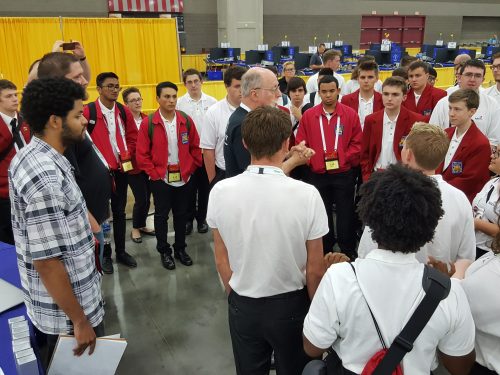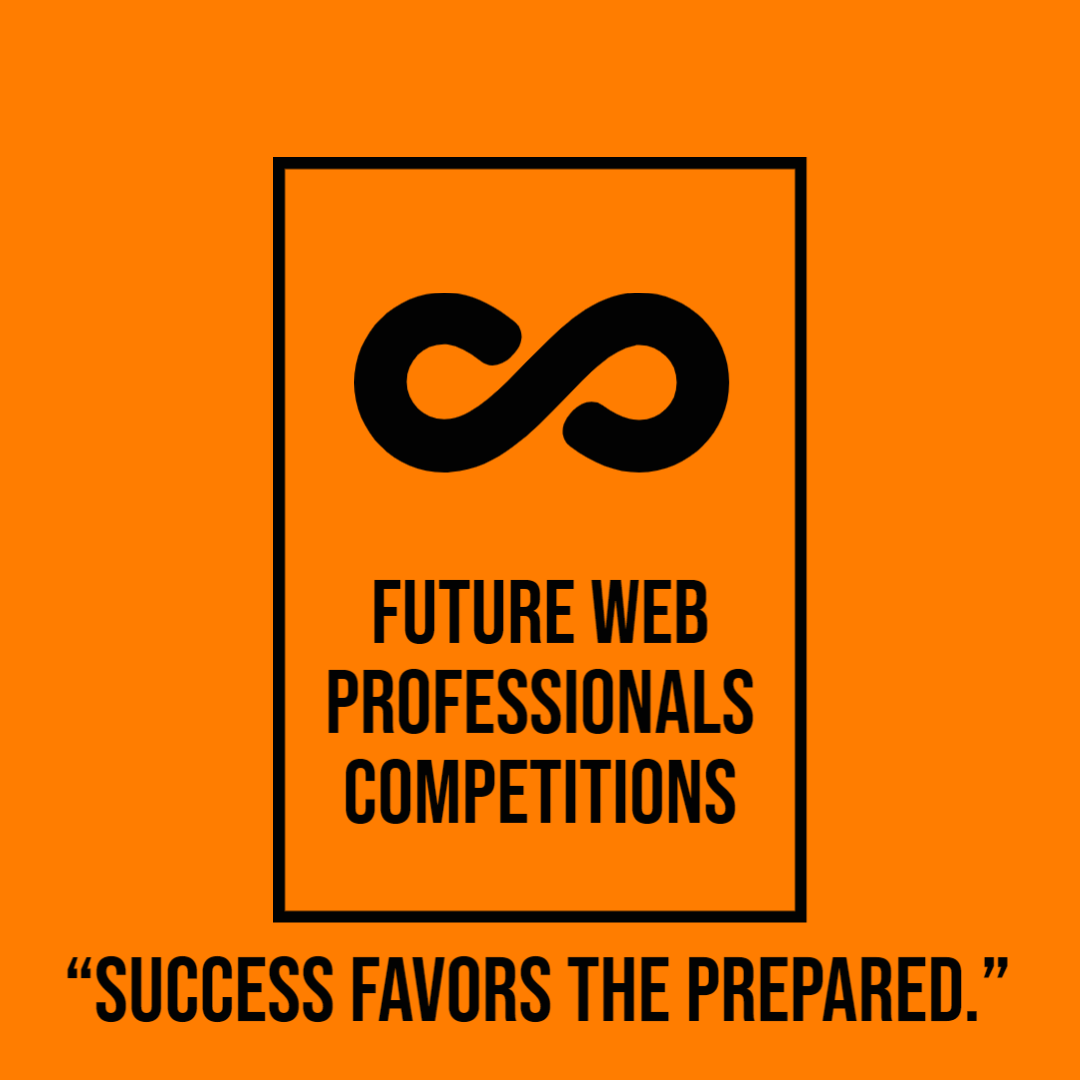Over the past 25 years, we have been working hand in hand with education as we push forward our mission to support web professionals with education, community, and certification. Over the years, funding requirements for career and technical education have shifted. We know that we need to do what we can to help administrators meet the funding requirements so they can continue to provide the tools teachers need to upskill students, open up career pathways, and ensure students’ career readiness for high-skill, high-wage, in-demand occupations.
As part of our mission to engage the next generation of professionals, we partnered with SkillsUSA in 2004 and started the National Web Design and Development Competitive Event. Our event team has run this competition ever since, and did not even skip a beat during COVID-19. We have learned so much over these years about how to blend industry expectations with secondary and post-secondary learners.

Our industry team that runs the SkillsUSA event also has experience developing and running international competitions in artificial intelligence, robotics and game development. It is this wealth of experience that brings us to where we are today and our announcement for a new competition.
In this article we will discuss:
- Our history of successfully running web competitions
- The creation of a new competition model
- The three competition variations
- The career pathway trinity of curriculum, certification, and competition
- How the competitions will develop the next generation of students/future web professionals
Background
We have had teachers asking us to run more competitions for years. While we have always been willing, we knew we had to do it in a way that could scale easily and enable students anywhere in the world to not only compete but also to learn. Otherwise, we would not be meeting our core mission.
Behind the scenes, we have been testing a new virtual competition model. This model will allow us to provide an international industry competition for secondary education students. All our testing has shown us that we have a viable competition system ready to go. Creating this virtual competition also allows us to push forward the message of how people with disabilities or specific conditions that might make other careers difficult are not a limitation in the broad and welcoming world of web professional careers.
During the first year of the COVID-19 pandemic, we were one of only two competitive teams who ran their SkillsUSA National Competition. We were not going to let COVID break our perfect record of running our part of the SkillsUSA competitive events. Admittedly, we were not allowed to run the event as an official SkillsUSA competition. We had already taken steps to simulate a web environment at Skills, so we simply took some of that experience and ran our web design competition virtually in 2020 for SkillsUSA programs who wanted to take part in the web design event in an unofficial capacity.
One teacher who recently ran a competition had this to say about the experience: “If they want a great experience, they should use this program for running the competition. Anyone who is even remotely knowledgeable in using a computer can get the students on and running in the event. Most of it is hands-off for the advisor and the students do the bulk of the work. The user experience was great from a student’s perspective. I was very happy to find out that we were getting to have a professional experience in the web design category that was going to challenge my students and provide all of the necessary online materials for the competition. Thank you for making this event possible first and foremost. Without Web Professionals Org and their team, we wouldn’t have had a web design event in Mississippi.”
It is through this experience we realized that many schools have situations where it is not feasible to compete in a standard career and technical student organization (CTSO) event, yet they need to compete in a national event to meet some of their funding requirements. As the international professional industry organization we have the real-world experience and technical expertise to deliver competitions that are equitable, accessible and simple for educators to implement. We see the need and we can fill the need.
Overview of the New Competition
We are proud to announce that the Web Professionals Organization will be running the following Future Web Professionals competitions virtually beginning in the 22/23 school year for the benefit of US-based and international career and technical education partner programs.
The motto of the Future Web Professionals competition is “Success Favors the Prepared.” We feel this fits with what we want our educators as well as future and current professional members to always remember. Lifelong learners are always striving to be prepared. Let’s face it—industry leaders are always better prepared. We see this as the next stage in supporting creating the next generation of industry professionals.
In talking to our secondary educators, we found that many of them see a group of three areas that their learners are most attracted to.
- Web design is a first obvious pick as it is the in-demand and high-paying career most people think of when they hear the words “web professional.” And they are right—as the U.S. Department of Labor cites the profession as one of the most high-demand, high-skill and high-paying.
- Web animation is a bit more subtle of a choice and may not be as obvious. As companies look to market and brand themselves, they are always seeking to visually engage their target audiences with new innovative messaging on websites and social media. Web animation is one of the most important tools web professionals can use to help their clients propel their stories with or without dialogue. This career path has a ton of opportunities in web marketing, media and entertainment industries.
- Web game design is another pathway that attracts audiences and enables them to experience a company’s brand and story. Web games can attract new audiences to a website and allow new markets to discover brands organically through social media platforms. The game design pathway also teaches the value of interactivity in engagement. Today, 50% of all video gaming revenue comes from games played on mobile devices and 30% of mobile gamers are over 45 years old. Web game development is all about combining story, graphics, and choice into playable experiences. We also find that experience in developing web-based games helps strengthen a designer’s overall skill set.

We will issue awards to top-performing future designers as well as acknowledge schools nationally for their work in preparing future professionals. The competitions will run so that both fall and spring semester learners can participate.
Preparation—Curriculum, Certification, and Competition
We are a non-profit industry organization with a 25-year history of working not only with industry, but also with education and workforce. We have seen what it takes to prepare individuals for high-skill, high-wage, in-demand occupations. A competition alone is not the way. We know it takes a village to raise a child, and it takes a similar approach to raise a professional.
Each of these competitions is part of what we see as the career pathway trinity or what we refer to internally as the 3Cs: Curriculum, Certification, and Competition.
- Curriculum: We create the foundation for your students to learn through a media-rich, real-world and project-based approach. This is not about simply learning coding skills, but engaging in the concepts, hard and soft skills that we know are important as professionals. This creates the whole learner who becomes a whole professional.
- Certification: The curriculum prepares the students to earn international industry-recognized certifications. However, our model of certification represents far more than passing an exam—our certification represents the whole learner. The whole future professional. Students are acknowledged for completing a career readiness body of work. They express their development through their college and career-ready portfolios with real-world examples of their creativity, problem-solving, and soft and technical skills. The capstone in each learner’s portfolio is the student’s ethics in the workplace micro-credential and their international industry-recognized certification. Their portfolio is portable and becomes a testament to career preparation success and a confidence-boosting career-affirming expression of each future professional.
- Competition: Finally, we offer the learners the opportunity to compete and test their skills on an international stage. As a professional organization, we are naturally global in scope. We are US-based, and we work to support professionals domestic and international. The international context of the competition reminds learners that they are part of a global community. In the future, they may work for international companies or have international team members—and they are always in competition on a global scale. Regardless of how well students do in the competition, they learn valuable skills in meeting project expectations and having their work stand with the work of those around the U.S. and the rest of the globe.
Helping you meet Carl Perkins funding requirements
For years we have heard from administrators, department chairs, and countless educators about the struggles they have trying to balance the needs of their learners and the demands of Carl Perkins funding. For larger districts with more administrative support this may not be a pressing issue—however, this can be a daunting task for rural, urban and small districts. We believe we are making it easier for all educators to get their funding by taking advantage of our curriculum, certification, and competition approach. If you want to talk with us, reach out to us at Steve@4WebPro.org.
We are excited to offer this opportunity to CTE educators. We know that by adding this component to a CTE program we can help schools fulfill their Carl Perkins funding requirements more easily. We understand the frustration administrators feel and are doing what we can to make it a bit easier. We also see this as an opportunity for us to meet our mission and help welcome the future generation of web professionals, some of whom will eventually take our places here at their Web Professionals Organization and do their part for the future.
One more note
As of the 22/23 school year, we will only offer this competition for our secondary partners. However, our post-secondary partners are already asking when it will be available to them. We promise that we are serious about bringing the competition to post-secondary and our workforce partners, but for now we ask them to remain patient. Please reach out to us today with any questions about this exciting new model.


